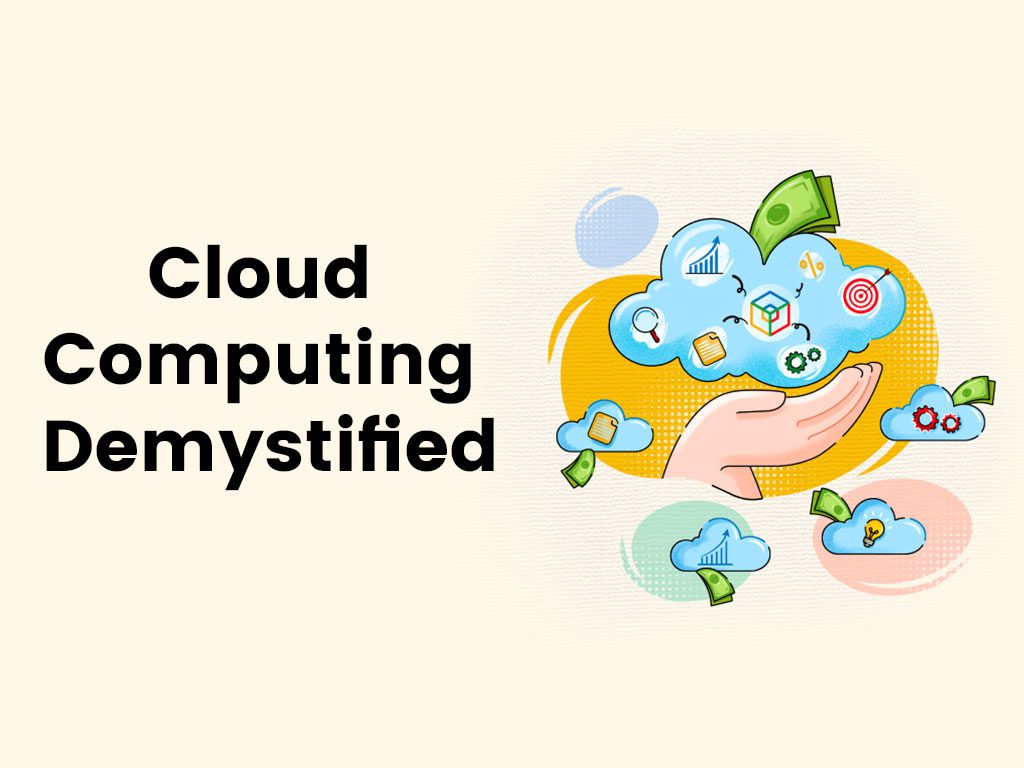Cloud computing has become an integral part of our modern digital landscape. It has revolutionized the way businesses and individuals store, access, and manage their data and applications. But what exactly is cloud computing? In simple terms, it refers to the delivery of computing services over the internet, providing on-demand access to a shared pool of resources such as servers, storage, databases, and software.
What is Cloud Computing?
Cloud computing can be defined as the practice of using a network of remote servers hosted on the Internet to store, manage, and process data instead of using a local server or personal computer. It offers several advantages over traditional computing models, including scalability, cost-efficiency, and ease of access. With cloud computing, users can easily access their files and applications from anywhere, at any time, using any device with an internet connection.
Understanding the Benefits of Cloud Computing
The benefits of cloud computing are numerous, making it an attractive choice for businesses and individuals alike. One of the key advantages is scalability. Cloud computing allows users to easily scale their resources up or down based on their needs, ensuring optimal performance and cost-efficiency. It also eliminates the need for upfront infrastructure investment, as cloud service providers handle the hardware and software infrastructure.
Another advantage of cloud computing is cost efficiency. With traditional computing models, businesses often end up paying for unused resources. However, cloud computing follows a pay-as-you-go model, meaning you only pay for the resources you actually use. This can result in significant cost savings, especially for small businesses or startups with limited budgets.
Additionally, cloud computing offers enhanced collaboration and flexibility. With cloud-based collaboration tools, teams can work on the same documents simultaneously, improving productivity and efficiency. Cloud computing also enables remote work, allowing employees to access their work files and applications from anywhere, which is especially beneficial in today’s increasingly mobile workforce.
Different Types of Cloud Computing Services
Cloud computing services can be broadly categorized into three main types: Infrastructure as a Service (IaaS), Platform as a Service (PaaS), and Software as a Service (SaaS).
Infrastructure as a Service (IaaS): With IaaS, users can rent virtualized hardware resources such as servers, storage, and networking from a cloud service provider. This allows businesses to quickly scale their infrastructure without the need for physical hardware investments. Examples of IaaS providers include Amazon Web Services (AWS), Microsoft Azure, and Google Cloud Platform.
Platform as a Service (PaaS): PaaS provides a platform for developers to build, deploy, and manage applications without the need to worry about the underlying infrastructure. PaaS offerings typically include development tools, databases, and deployment environments. Popular PaaS providers include Heroku, Google App Engine, and Microsoft Azure.
Software as a Service (SaaS): SaaS delivers software applications over the internet, eliminating the need for users to install and maintain software on their local devices. Examples of SaaS include web-based email services like Gmail, project management tools like Asana, and customer relationship management (CRM) software like Salesforce.
Exploring Cloud Computing Solutions for Businesses
Cloud computing offers numerous solutions and services tailored to meet the specific needs of businesses. One of the most popular solutions is cloud storage, which provides businesses with a secure and scalable way to store and access their data. Cloud storage providers offer different storage options, ranging from basic file storage to more advanced features like data backup and synchronization.
Another important cloud computing solution for businesses is cloud-based application hosting. By hosting their applications in the cloud, businesses can reduce the need for on-premises infrastructure, improve scalability, and enhance accessibility. Cloud hosting providers offer various options, including virtual machines, containers, and serverless computing.
Moreover, cloud computing enables businesses to leverage advanced technologies such as machine learning and artificial intelligence. Cloud service providers offer pre-built machine learning models and APIs that businesses can use to develop intelligent applications without the need for extensive data science expertise. This opens up new opportunities for businesses to gain insights from their data and drive innovation.
Cloud Computing Courses and Training Programs
As cloud computing continues to gain momentum, the demand for professionals with cloud computing skills is on the rise. Fortunately, there are numerous courses and training programs available to help individuals learn and develop their cloud computing skills.
One popular option is to pursue certifications offered by leading cloud service providers such as AWS, Microsoft, and Google. These certifications validate your understanding and proficiency in using their respective cloud platforms and services. They cover various topics, including cloud architecture, security, and deployment.
Additionally, there are online learning platforms that offer comprehensive cloud computing courses and tutorials. These platforms provide a wide range of courses suitable for beginners as well as professionals looking to expand their knowledge. Some popular online learning platforms include Coursera, Udemy, and Pluralsight.
How to Learn Cloud Computing: A Step-by-Step Guide
Learning cloud computing may seem daunting, but with the right approach, anyone can acquire the necessary skills. Here’s a step-by-step guide to help you get started:
- Understand the Basics: Begin by familiarizing yourself with the fundamental concepts and terminology of cloud computing. This will provide you with a solid foundation to build upon.
- Choose a Cloud Service Provider: Decide which cloud service provider you want to focus on. Each provider has its own unique offerings and certifications, so it’s important to choose one that aligns with your goals and interests.
- Enroll in a Course or Training Program: Sign up for a comprehensive cloud computing course or training program. Look for courses that cover the key concepts, services, and best practices of the chosen cloud service provider.
- Hands-on Practice: Put your knowledge into practice by working on real-world projects or labs. This will help you gain practical experience and reinforce your understanding of cloud computing concepts.
- Earn Certifications: Consider pursuing certifications offered by the chosen cloud service provider. Certifications not only enhance your resume but also demonstrate your expertise and commitment to continuous learning.
- Stay Updated: Cloud computing is a rapidly evolving field, so it’s important to stay updated with the latest trends, technologies, and best practices. Follow industry blogs, attend webinars, and join online communities to stay connected with the cloud computing community.
Cloud Computing Basics: Key Concepts and Terminology
To have a solid understanding of cloud computing, it’s essential to be familiar with some key concepts and terminology. Here are a few important ones:
Virtualization: Virtualization refers to the creation of virtual instances of resources, such as servers or storage, on a physical machine. It allows for more efficient utilization of hardware resources and enables the flexibility and scalability of cloud computing.
Elasticity: Elasticity is the ability to scale resources up or down based on demand. In cloud computing, resources can be easily added or removed to meet the changing needs of users.
Multi-tenancy: Multi-tenancy is a concept where multiple users or organizations share the same physical resources in the cloud while maintaining isolation and security.
Service Level Agreement (SLA): An SLA is a contract between a cloud service provider and a customer that outlines the agreed-upon level of service, including performance, availability, and support.
Data Security: Data security is a critical aspect of cloud computing. It involves implementing measures to protect data from unauthorized access, loss, or corruption.
Cloud Computing Providers and Their Services
There are several major cloud computing providers in the market, each offering a wide range of services and solutions. Here are a few of the leading providers and an overview of their offerings:
Amazon Web Services (AWS): AWS is one of the pioneers in cloud computing and offers a comprehensive suite of services, including computing, storage, networking, databases, machine learning, and more.
Microsoft Azure: Azure is Microsoft’s cloud computing platform that provides a wide range of services, including virtual machines, databases, AI services, IoT, and developer tools.
Google Cloud Platform (GCP): GCP offers a variety of services, including computing, storage, databases, machine learning, and data analytics. It also provides advanced tools for developers and data scientists.
IBM Cloud: IBM Cloud offers a range of services, including computing, storage, AI, IoT, blockchain, and data analytics. It also provides industry-specific solutions for sectors like healthcare, finance, and retail.
Oracle Cloud: Oracle Cloud offers a comprehensive set of cloud services, including computing, storage, databases, AI, blockchain, and developer tools. It also specializes in enterprise-grade applications and solutions.
The Future of Cloud Computing and Its Impact on Industries
As cloud computing continues to evolve, its impact on industries is becoming increasingly significant. Here are a few areas where cloud computing is expected to have a transformative effect:
Artificial Intelligence and Machine Learning: Cloud computing provides the necessary infrastructure and tools for businesses to leverage AI and machine learning technologies. This enables them to extract valuable insights from data, automate processes, and enhance decision-making.
Internet of Things (IoT): The massive amount of data generated by IoT devices requires robust and scalable computing resources. Cloud computing provides the ideal platform to process, store, and analyze IoT data, enabling businesses to derive meaningful insights and deliver innovative IoT solutions.
Big Data Analytics: Cloud computing offers the scalability and processing power required for big data analytics. By leveraging cloud-based analytics tools, businesses can analyze large volumes of data in real time and gain actionable insights to drive decision-making.
Edge Computing: Edge computing is a paradigm where data processing and storage are performed closer to the source, reducing latency and improving efficiency. Cloud computing plays a crucial role in enabling edge computing by providing the necessary infrastructure and services.
Conclusion
Cloud computing has transformed the way we store, access, and manage data and applications. It offers numerous benefits, including scalability, cost-efficiency, and flexibility. By understanding the key concepts and exploring the different types of cloud computing services, businesses can harness the power of the cloud to drive innovation and growth. With the availability of cloud computing courses and training programs, anyone can learn and develop their cloud computing skills. As the future of cloud computing unfolds, its impact on industries is expected to be significant, driving advancements in artificial intelligence, IoT, big data analytics, and edge computing. Embracing cloud computing is no longer an option, but a necessity for businesses looking to stay competitive in the digital age.
CTA: Ready to embark on your cloud computing journey? Enroll in a cloud computing course today and unlock the full potential of the cloud.








Hairstyles
December 5, 2024You made some decent points there. I looked on the internet for the issue and found most guys will go along with with your blog.
Hairstyles
December 5, 2024There are some attention-grabbing deadlines in this article but I don抰 know if I see all of them middle to heart. There’s some validity however I’ll take hold opinion until I look into it further. Good article , thanks and we would like more! Added to FeedBurner as well